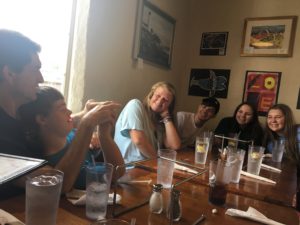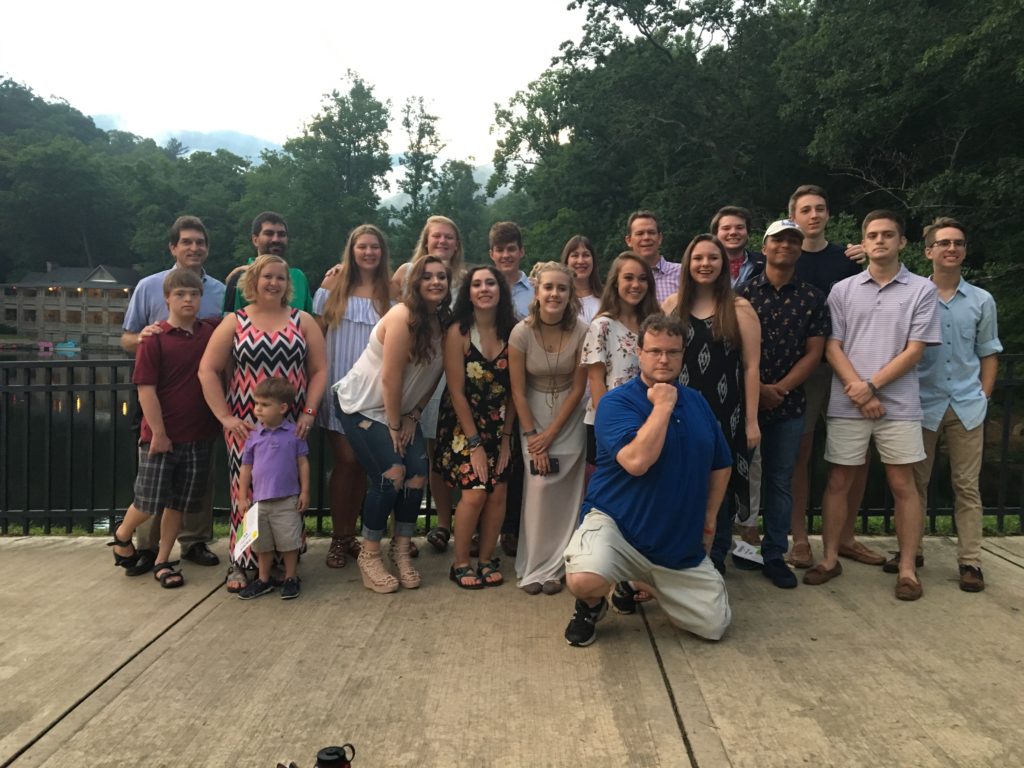How many of you would say you “love” the law, or at least rules? Are you sticklers for things like speed limits? Does it make you crazy when people are turning left at the intersection and don’t pass each other first, or don’t take turns at a 4-way stop? What about when watching sports? Do you find yourself explaining or arguing with other fans about technicalities, or try to beat the referees to the call? Rules and laws are something that we tend to have decided opinions on, sometimes strong ones, or at least deeply engrained behaviors, such as what speed we will travel in relation to the speed limit. Admittedly, I am on one of the rule followers. I like structure and boundaries and order in my life and in the world around me. It makes me a good Presbyterian, with our detailed polity and systems and procedures. Rules and regulations bring me a sense of comfort and security. While I am absolutely willing to push back against rules that I don’t agree with, that generally also takes the form of following the system to change the rule, rather than just outright rebellion. When those around me aren’t following the same set of rules, I feel anxious and irritated. Yes, I’m the person that mentally counts items the person in front of me has in the 10 items or less line if it looks like it’s getting close. It would be fair to say that I love rules.
So does the Psalmist. The Psalmist writes a beautiful prayer about delighting and loving the law of the Lord. Such an ode to God’s instructions is comprehensive. At 176 verses, it is the longest chapter in the entire Bible. The verses assigned to us today from the lectionary cycle emphasize one of its major themes; the joy of following the commandments God has given, naming them as life-giving and uplifting. This is an acrostic Psalm, meaning each of the 22 stanzas (of 8 verses each) begins with a different letter, in Hebrew from Aleph to Tav, in English it would be from A to Z. Perhaps it could have been used to teach. One traditional legend in the Orthodox church, who actively uses this Psalm regularly even suggests that King David used this Psalm to teach Solomon not just the alphabet, but an alphabet for the spiritual life. The Psalmist does a pretty good job in laying out the importance of the Torah, the sacred law of God’s people Israel. Verse 97 flat out says “Oh, how I love your law!” The Psalm is a beautiful poetic homage to God’s power and role as teacher, and gives us a clue as to how we are to relate to God as well. Verse 105 reads: “Your word is a lamp to my feet and a light to my path” (verse 105). The Psalm reminds us that one of the purposes for God’s laws is to have relationship with how we live our lives. If we truly love God, and love the instructions that God gives, we will live into them, with God’s help.
The Apostle Paul had a lot of ideas about how that looked in the first century, and his writings can help inspire us today, to consider how we are applying those ancient laws captured in our sacred texts to the world we know. Throughout his letters, Paul wrestles with what to make of the law in light of the grace shown in Christ’s life, death, and resurrection. He wants to be clear that the early church understands that their actions are not going to be what makes the difference to their salvation – it’s the grace of God that does that. Nevertheless, though, what they do does matter. Repeatedly he calls God’s people to live in ways authentic to the faith they profess. This is especially true in his letter to the Romans. Our text today from Romans 13 is the heart of Paul’s treatise on Christian ethics, the integration of life and faith. David Bartlett offers that:
Roman 1-11 spells out the first part of the commandment: “How do we love God with heart, mind, soul, and strength?” Clue: have faith in Jesus. [Then,] Romans 12-14 shows the various ways in which we live out the second part: Love your neighbor as you love yourself. The summary is itself good news[i].
In these verses, Paul emphasizes a well-known refrain, made clear in Leviticus (19:18) and by Jesus himself with the giving of the Greatest Commandment (Matthew 22:36-40). If there is only one thing that we are to remember about how we are to live it should be this: the law of love. This is the identity marker for us as Christians, what makes us who we are.
It is easy to misinterpret this law. Our first inclination is to get wrapped up in the Hollywood and Hallmark illustrations of a saccharine-sweet and unrealistic set of amorous feelings for the whole world. We treat love as an emotion, something we’re just supposed to feel, that makes us all smiley and happy because, well, we just love everyone. Sometimes, this becomes a hypothetical ideal that we can never really achieve, much like a notion of “world peace.” But Paul doesn’t mean for it to be inaccessible. He uses the Greek word agape for love in this passage, which is not the kind of doe-eyed mushy stuff sense of love. Rather, it is a love that is related to doing things for the benefit of another person, an unselfish concern for others and willingness to seek the best for them. In Paul’s instructions, the law of love, he is calling for love that has tangible signs. It is:
the difficult task of real love for real people who are met in everyday life, not theoretical love for humanity as a whole[ii].
For Paul, love is about action, not just emotion. Love needs to be a verb, THE verb, for how we live as those who delight in God’s law and seek to fulfill it.
Right now in our world, I think LOVE is what is at stake, and how we respond to it will make all the difference. As those who believe in the life-changing power of the love of God through Jesus Christ, we have to live like it matters. We have to follow the law of love. And in times when love is threatened or challenged, that is even more important.
Just over a year ago, in the wake of the senseless and heartbreaking attack on PULSE nightclub in Orlando, Florida, one Tony Award winning speech broke through some of the darkness with words of light. Lin-Manuel Miranda, a composer, lyricist, playwright and actor, won several awards for his creative work in Hamilton, including Best Score. Take a moment to see how he thanked and inspired the crowd [start video clip around 1:40]:
[I’m not freestyling. I’m too old. I wrote you a sonnet instead.
My wife’s the reason anything gets done.
She nudges me towards promise by degrees.
She is a perfect symphony of one.
Our son is her most beautiful reprise.
We chase the melodies that seem to find us
Until they’re finished songs and start to play.
When senseless acts of tragedy remind us
That nothing here is promised, not one day
This show is proof that history remembers.
We live through times when hate and fear seem stronger.
We rise and fall, and light from dying embers
Remembrances that hope and love last longer.
And love is love is love is love is love is love is love is love;
Cannot be killed or swept aside.
I sing Vanessa’s symphony; Eliza tells her story.
Now fill the world with music, love, and pride.
Thank you so much for this]
In the face of struggle and tragedy, love is what is going to make the difference. Love is what brings us together in community with each other. “Love does no wrong to a neighbor,” Paul writes (Romans 13:10). It’s not a trick we have to figure out. Look around you. Those are your neighbors. Think about another person, another group, as far away as you can imagine. Those are also your neighbors. All of God’s children are your neighbors. That means everybody. So, wherever we are, there will always be neighbors around, and with them there will be countless opportunities for us to embody the law of love.
You can do it here in our Sanctuary – consider our youngest worshipping neighbors, the ones who sit on the steps with me each week. Love is being the body of Christ to them, and not just saying they are welcome here, but creating a space in our Sanctuary for them in the PRAYground where they can engage in worship in meaningful ways to them. Love is greeting them, passing the peace, asking them what they learned about God today, or even what they might teach you. The law of love means that everything we do in relation to our children in this place comes from love- our love of them, our desire of them to know God’s love through us and through hymns and scriptures and sermons and communion, and most of all, our hope that they will develop a love for Jesus here.
Opportunities for practicing the love abound for our lawmakers. Right now, they face the monumental task of working together across party lines to address critical issues of immigration for those who arrived in our country as children. They are charged with financial decisions about debt ceilings that impact aid given to hurricane flooding victims and countless other programs. We need to pray for their conversations to be filled with love so that they can work together, and that love will infuse their decisions. And we need to act, to encourage our representatives to create rules and regulations and systems that practice the law of love for our neighbors.
And the law of love is already at work in many places.
The law of love is up the hill – as cars drove through our parking lot yesterday and were filled with produce for the mobile food pantry. As donations of clothing are examined and tagged and displayed as a store-like shopping experience to bring dignity to those in need.
The law of love is in Texas. Do you know about the Louisiana Cajun Navy? (https://www.facebook.com/LaCajunNavy/) It’s an informal, ad-hoc volunteer group of private boat owners who assist in search and rescue efforts. They formed in the aftermath of Hurricane Katrina in 2005, and resurfaced last year after flooding in Louisiana. Two weeks ago, they lined the highways heading towards Texas with bass boats, johnboats, air boats, and other shallow-draft craft that can navigate flood waters to bring relief and rescue. The motto on their facebook reads “We the people of Louisiana refuse to stand by and wait for help in the wake of disasters in our State. We rise up and unite and rescue our neighbors!” A similar sense of fellowship is happening here in Georgia, as those from the coast evacuated up 75 and find welcome and shelter.
The law of love is in the responses of the Presbyterian Disaster Assistance, too, not just in Texas and those in the path of Irma, but in other places impacted by flooding, including the South Sudan, Sierra Leone, Madagascar, Malawi, Columbia, and Peru. PDA’s work also extends beyond natural disasters, providing relief and support to refugees, war-torn places, those struggling with famine and hunger and more. Our fish banks and offerings to One Great Hour of Sharing at Easter help support these ministries, and there may be opportunities coming for us to take part in their relief efforts.
This is what fulfilling the law of God looks like. It’s not rigid and legalistic, stuffy or boring; it’s engaging and active, alive and full. It is love as a verb. In big and small ways, there are moments where you can practice this kind of love, a love of action, that actively promotes the well-being and good of another person. Any other person. When we love our neighbors, we fulfill the most core aspect of the law by which God intends we live. And when that happens, I think it’s more than just us who are delighted. God is as well. May it be so. Amen.
~Rev. Elizabeth Lovell Milford
September 10, 2017
———————————————————————————
[i] David L. Bartlett, “Homiletical Perspective: Romans 13:8-14,” Feasting on the Word: Year A, Volume 4, David L. Bartlett and Barbara Brown Taylor, editors, (Louisville, KY: Westminster John Knox Press, 2011).
[ii] Walter Brueggemann, Charles B. Cousar, Beverly R. Gaventa, and James D. Newsome, “Proper 18,” Texts for Preaching: A Lectionary Commentary Based on the NRSV – Year A, (Louisville, KY: Westminster John Knox Press, 1995).











